Weekly Tax Brief
2022 Q1 tax calendar: Key deadlines for businesses and other employers
- Details
- Published: 21 December 2021 21 December 2021
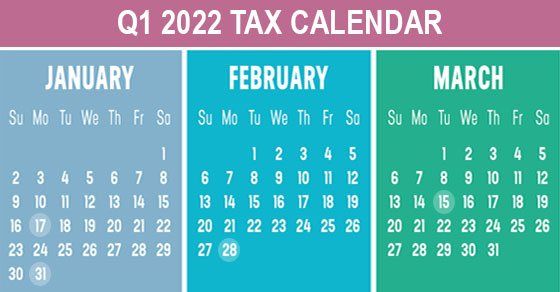
Here are some of the key tax-related deadlines affecting businesses and other employers during the first quarter of 2022. Keep in mind that this list isn’t all-inclusive, so there may be additional deadlines that apply to you. Contact us to ensure you’re meeting all applicable deadlines and to learn more about the filing requirements.
January 17 (The usual deadline of January 15 is a Saturday)
- Pay the final installment of 2021 estimated tax.
- Farmers and fishermen: Pay estimated tax for 2021.
January 31
- File 2021 Forms W-2, “Wage and Tax Statement,” with the Social Security Administration and provide copies to your employees.
- Provide copies of 2021 Forms 1099-MISC, “Miscellaneous Income,” to recipients of income from your business where required.
- File 2021 Forms 1099-MISC, reporting nonemployee compensation payments in Box 7, with the IRS.
- File Form 940, “Employer’s Annual Federal Unemployment (FUTA) Tax Return,” for 2021. If your undeposited tax is $500 or less, you can either pay it with your return or deposit it. If it’s more than $500, you must deposit it. However, if you deposited the tax for the year in full and on time, you have until February 10 to file the return.
- File Form 941, “Employer’s Quarterly Federal Tax Return,” to report Medicare, Social Security and income taxes withheld in the fourth quarter of 2021. If your tax liability is less than $2,500, you can pay it in full with a timely filed return. If you deposited the tax for the quarter in full and on time, you have until February 10 to file the return. (Employers that have an estimated annual employment tax liability of $1,000 or less may be eligible to file Form 944, “Employer’s Annual Federal Tax Return.”)
- File Form 945, “Annual Return of Withheld Federal Income Tax,” for 2021 to report income tax withheld on all nonpayroll items, including backup withholding and withholding on accounts such as pensions, annuities and IRAs. If your tax liability is less than $2,500, you can pay it in full with a timely filed return. If you deposited the tax for the year in full and on time, you have until February 10 to file the return.
February 28
- File 2021 Forms 1099-MISC with the IRS if: 1) they’re not required to be filed earlier and 2) you’re filing paper copies. (Otherwise, the filing deadline is March 31.)
March 15
- If a calendar-year partnership or S corporation, file or extend your 2021 tax return and pay any tax due. If the return isn’t extended, this is also the last day to make 2021 contributions to pension and profit-sharing plans.
© 2021
Stock market investors: Year-end tax strategies to consider
- Details
- Published: 16 December 2021 16 December 2021
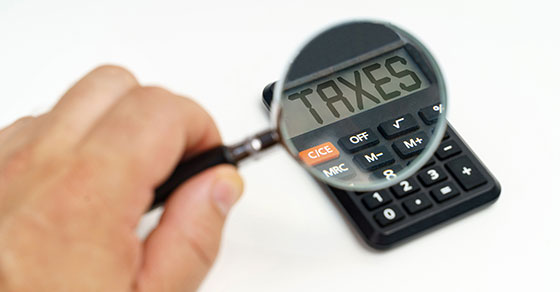
Year-end is a good time to plan to save taxes by carefully structuring your capital gains and losses.
Consider some possibilities if you have losses on certain investments to date. For example, suppose you lost money this year on some stock and have other stock that has appreciated. Consider selling appreciated assets before December 31 (if you think their value has peaked) and offsetting gains with losses.
Long-term capital losses offset long-term capital gains before they offset short-term capital gains. Similarly, short-term capital losses offset short-term capital gains before they offset long-term capital gains. You may use up to $3,000 ($1,500 for married filing separately) of total capital losses in excess of total capital gains as a deduction against ordinary income in computing your adjusted gross income (AGI).
Individuals are subject to federal tax at a rate as high as 37% on short-term capital gains and ordinary income. But long-term capital gains on most investments receive favorable treatment. They’re taxed at rates ranging from zero to 20% depending on your taxable income (inclusive of the gains). High-income taxpayers pay an additional 3.8% net investment income tax on their net gain and certain other investment income.
This means you should try to avoid having long-term capital losses offset long-term capital gains since those losses will be more valuable if they’re used to offset short-term capital gains or up to $3,000 per year of ordinary income. This requires making sure that the long-term capital losses aren’t taken in the same year as the long-term capital gains.
However, this isn’t just a tax issue. Investment factors must also be considered. You don’t want to defer recognizing gain until next year if there’s too much risk that the investment’s value will decline before it can be sold. Similarly, you wouldn’t want to risk increasing a loss on investments you expect to decline in value by deferring a sale until the following year.
To the extent that taking long-term capital losses in a different year than long-term capital gains is consistent with good investment planning, take steps to prevent those losses from offsetting those gains.
If you’ve yet to realize net capital losses for 2021 but expect to realize net capital losses next year well in excess of the $3,000 ceiling, consider accelerating some excess losses into this year. The losses can offset current gains and up to $3,000 of any excess loss will become deductible against ordinary income this year.
For the reasons outlined above, paper losses or gains on stocks may be worth recognizing this year. But suppose the stock is also an investment worth holding for the long term. You can’t sell stock to establish a tax loss and buy it back the next day. The “wash sale” rule precludes recognition of a loss where substantially identical securities are bought and sold within a 61-day period (30 days before or 30 days after the date of sale).
However, you may be able to realize a tax loss by:
- Selling the original holding and then buying the same securities at least 31 days later. The risk is interim upward price movement.
- Buying more of the same stock, then selling the original holding at least 31 days later. The risk is interim downward price movement.
- Selling the original holding and buying similar securities in different companies in the same line of business. This trades on the prospects of the industry, rather than the particular stock.
- Selling an original holding of mutual fund shares and buying shares in another fund with a similar investment strategy.
Careful handling of capital gains and losses can save tax. Contact us if you have questions about these strategies.
© 2021
Providing a company car? Here’s how taxes are handled
- Details
- Published: 14 December 2021 14 December 2021

The use of a company vehicle is a valuable fringe benefit for owners and employees of small businesses. This perk results in tax deductions for the employer as well as tax breaks for the owners and employees using the cars. (And of course, they get the nontax benefit of getting a company car.) Plus, current tax law and IRS rules make the benefit even better than it was in the past.
The rules in action
Let’s say you’re the owner-employee of a corporation that’s going to provide you with a company car. You need the car to visit customers, meet with vendors and check on suppliers. You expect to drive the car 8,500 miles a year for business. You also expect to use the car for about 7,000 miles of personal driving, including commuting, running errands and weekend trips. Therefore, your usage of the vehicle will be approximately 55% for business and 45% for personal purposes. You want a nice car to reflect positively on your business, so the corporation buys a new $55,000 luxury sedan.
Your cost for personal use of the vehicle is equal to the tax you pay on the fringe benefit value of your 45% personal mileage. By contrast, if you bought the car yourself to be able to drive the personal miles, you’d be out-of-pocket for the entire purchase cost of the car.
Your personal use will be treated as fringe benefit income. For tax purposes, your corporation will treat the car much the same way it would any other business asset, subject to depreciation deduction restrictions if the auto is purchased. Out-of-pocket expenses related to the car (including insurance, gas, oil and maintenance) are deductible, including the portion that relates to your personal use. If the corporation finances the car, the interest it pays on the loan would be deductible as a business expense (unless the business is subject to the business interest expense deduction limitation under the tax code).
In contrast, if you bought the auto yourself, you wouldn’t be entitled to any deductions. Your outlays for the business-related portion of your driving would be unreimbursed employee business expenses that are nondeductible from 2018 to 2025 due to the suspension of miscellaneous itemized deductions under the Tax Cuts and Jobs Act. And if you financed the car yourself, the interest payments would be nondeductible.
And finally, the purchase of the car by your corporation will have no effect on your credit rating.
Necessary paperwork
Providing an auto for an owner’s or key employee’s business and personal use comes with complications and paperwork. Personal use will have to be tracked and valued under the fringe benefit tax rules and treated as income. This article only explains the basics.
Despite the necessary valuation and paperwork, a company-provided car is still a valuable fringe benefit for business owners and key employees. It can provide them with the use of a vehicle at a low tax cost while generating tax deductions for their businesses. We can help you stay in compliance with the rules and explain more about this prized perk.
© 2021
How are court awards and out-of-court settlements taxed?
- Details
- Published: 09 December 2021 09 December 2021
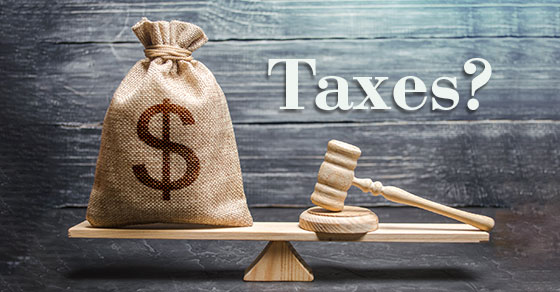
The tax implications of owning a corporate aircraft
- Details
- Published: 07 December 2021 07 December 2021

If your business is successful and you do a lot of business travel, you may have considered buying a corporate aircraft. Of course, there are tax and non-tax implications for aircraft ownership. Let’s look at the basic tax rules.
Business travel only
In most cases, if your company buys a plane used only for business, the company can deduct its entire cost in the year that it’s placed into service. The cases in which the aircraft is ineligible for this immediate write-off are:
- The few instances in which neither the 100% bonus depreciation rules nor the Section 179 small business expensing rules apply or
- When the taxpayer has elected out of 100% bonus depreciation and hasn’t made the election to apply Sec. 179 expensing.
In those cases, the depreciation schedule is 20% of the cost for year 1, 32% for year 2, 19.2% for year 3, 11.52% for year 4, 11.52% for year 5 and 5.76% for year 6. Note that the bonus depreciation rate is scheduled to be phased down for property placed in service after 2022.
Interestingly, these “cost recovery” rules are more favorable than the rules for business autos. The business auto rules place annual caps on depreciation and, in the year an auto is placed in service, both depreciation and Sec. 179 expensing.
In the case of a business-travel-only aircraft, post-acquisition expenses aren’t treated differently than post-acquisition expenditures for other machinery and equipment. For example, routine maintenance and repair expenses are immediately deductible while amounts that improve or restore the aircraft must be capitalized and depreciated.
The only “catch” that distinguishes the tax treatment of an aircraft used 100% for business travel from the treatment of most other machinery and equipment is that company aircraft are one of the categories of business property that require more rigorous recordkeeping to prove the connection of uses and expenses to business purposes.
Business and personal travel
Personal travel won’t affect the depreciation results discussed above if the value of the travel is compensation income (and is reported and withheld upon as such) to a person that isn’t at least a 5% owner or a person “related” to the corporation. This means, for example, that personal travel by a non-share-holding employee won’t affect depreciation if the value of the travel is compensation to him or her and is reported and withheld upon. The depreciation results can be affected if the person for whom the value of the travel is compensation income is at least a 5% shareholder or a related person. But even in that case, the depreciation results won’t be affected if you comply with a generous “fail-safe” rule.
With one limitation, personal travel won’t affect the treatment of otherwise-deductible post-acquisition expenditures if the value of the travel is compensation income (and is reported and withheld upon). The limitation is that if the person for whom the value of the travel is to be treated as compensation income is at least a 10% owner, director, officer or a person related to the corporation, the amount of the deduction for otherwise-deductible costs allocable to the personal travel can’t exceed the travel value.
Moving forward
Other rules and limitations may apply. As you can see, even in the case of an aircraft used for business and personal travel, these rules aren’t onerous. But they do require careful recordkeeping and, when an aircraft is used for personal travel, compliance with reporting and withholding requirements. Contact us to learn more in your situation.
© 2021
With year-end approaching, 3 ideas that may help cut your tax bill
- Details
- Published: 03 December 2021 03 December 2021
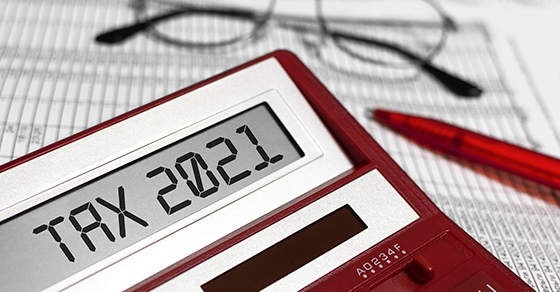
If you’re starting to worry about your 2021 tax bill, there’s good news — you may still have time to reduce your liability. Here are three quick strategies that may help you trim your taxes before year-end.
1. Accelerate deductions/defer income. Certain tax deductions are claimed for the year of payment, such as the mortgage interest deduction. So, if you make your January 2022 payment in December, you can deduct the interest portion on your 2021 tax return (assuming you itemize).
Pushing income into the new year also will reduce your taxable income. If you’re expecting a bonus at work, for example, and you don’t want the income this year, ask if your employer can hold off on paying it until January. If you’re self-employed, you can delay your invoices until late in December to divert the revenue to 2022.
You shouldn’t pursue this approach if you expect to be in a higher tax bracket next year. Also, if you’re eligible for the qualified business income deduction for pass-through entities, you might reduce the amount of that deduction if you reduce your income.
2. Maximize your retirement contributions. What could be better than paying yourself? Federal tax law encourages individual taxpayers to make the maximum allowable contributions for the year to their retirement accounts, including traditional IRAs and SEP plans, 401(k)s and deferred annuities.
For 2021, you generally can contribute as much as $19,500 to 401(k)s and $6,000 for traditional IRAs. Self-employed individuals can contribute up to 25% of your net income (but no more than $58,000) to a SEP IRA.
3. Harvest your investment losses. Losing money on your investments has a bit of an upside — it gives you the opportunity to offset taxable gains. If you sell underperforming investments before the end of the year, you can offset gains realized this year on a dollar-for-dollar basis.
If you have more losses than gains, you generally can apply up to $3,000 of the excess to reduce your ordinary income. Any remaining losses are carried forward to future tax years.
There’s still time
The ideas described above are only a few of the strategies that still may be available. Contact us if you have questions about these or other methods for minimizing your tax liability for 2021.
© 2021
Small businesses: There still may be time to cut your 2021 taxes
- Details
- Published: 30 November 2021 30 November 2021
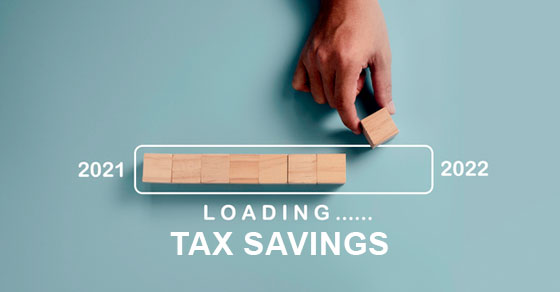
Don’t let the holiday rush keep you from considering some important steps to reduce your 2021 tax liability. You still have time to execute a few strategies.
Purchase assets
Thinking about buying new or used equipment, machinery or office equipment in the new year? Buy them and place them in service by December 31, and you can deduct 100% of the cost as bonus depreciation. Contact us for details on the 100% bonus depreciation break and exactly what types of assets qualify.
Bonus depreciation is also available for certain building improvements. Before the 2017 Tax Cuts and Jobs Act (TCJA), bonus depreciation was available for two types of real property: land improvements other than buildings (for example fencing and parking lots), and “qualified improvement property,” a broad category of internal improvements made to nonresidential buildings after the buildings are placed in service. The TCJA inadvertently eliminated bonus depreciation for qualified improvement property. However, the 2020 CARES Act made a retroactive technical correction to the TCJA. The correction makes qualified improvement property placed in service after December 31, 2017, eligible for bonus depreciation.
Keep in mind that 100% bonus depreciation has reduced the importance of Section 179 expensing. If you’re a small business, you’ve probably benefited from Sec. 179. It’s an elective benefit that, subject to dollar limits, allows an immediate deduction of the cost of equipment, machinery, “off-the-shelf” computer software and some building improvements. Sec. 179 expensing was enhanced by the TCJA, but the availability of 100% bonus depreciation is economically equivalent and thus has greatly reduced the cases in which Sec. 179 expensing is useful.
Write off a heavy vehicle
The 100% bonus depreciation deal can have a major tax-saving impact on first-year depreciation deductions for new or used heavy vehicles used over 50% for business. That’s because heavy SUVs, pickups and vans are treated for federal income tax purposes as transportation equipment. In turn, that means they qualify for 100% bonus depreciation.
Specifically, 100% bonus depreciation is available when the SUV, pickup or van has a manufacturer’s gross vehicle weight rating above 6,000 pounds. You can verify a vehicle’s weight by looking at the manufacturer’s label, which is usually found on the inside edge of the driver’s side door. If you’re considering buying an eligible vehicle, placing one in service before year end could deliver a significant write-off on this year’s return.
Time deductions and income
If your business operates on a cash basis, you can significantly affect your amount of taxable income by accelerating your deductions into 2021 and deferring income into 2022 (assuming you expect to be taxed at the same or a lower rate next year).
For example, you could put recurring expenses normally paid early in the year on your credit card before January 1 — that way, you can claim the deduction for 2021 even though you don’t pay the credit card bill until 2022. In certain circumstances, you also can prepay some expenses, such as rent or insurance and claim them in 2021.
As for income, wait until close to year-end to send out invoices to customers with reliable payment histories. Accrual-basis businesses can take a similar approach, holding off on the delivery of goods and services until next year.
Consider all angles
Bear in mind that some of these tactics could adversely impact other factors affecting your tax liability, such as the qualified business income deduction. Contact us to make the most of your tax planning opportunities.
© 2021
Remember to use up your flexible spending account money
- Details
- Published: 18 November 2021 18 November 2021

Do you have a tax-saving flexible spending account (FSA) with your employer to help pay for health or dependent care expenses? As the end of 2021 nears, there are some rules and reminders to keep in mind.
An account for health expenses
A pre-tax contribution of $2,750 to a health FSA is permitted in 2021. This amount is increasing to $2,850 for 2022. You save taxes in these accounts because you use pre-tax dollars to pay for medical expenses that might not be deductible. For example, they wouldn’t be deductible if you don’t itemize deductions on your tax return. Even if you do itemize, medical expenses must exceed a certain percentage of your adjusted gross income in order to be deductible. Additionally, the amounts that you contribute to a health FSA aren’t subject to FICA taxes.
Your employer’s plan should have a listing of qualifying items and any documentation from a medical provider that may be needed to get reimbursed for these items.
FSAs generally have a “use-it-or-lose-it” rule, which means you must incur qualifying medical expenditures by the last day of the plan year (December 31 for a calendar year plan) — unless the plan allows an optional grace period. A grace period can’t extend beyond the 15th day of the third month following the close of the plan year (March 15 for a calendar year plan). What if you don’t spend the money before the last day allowed? You forfeit it.
An additional exception to the use-it-or-lose-it rule permits health FSAs to allow a carryover of a participant’s unused health FSA funds of up to $550. Amounts carried forward under this rule are added to the up-to-$2,750 amount that you elect to contribute to the health FSA for 2021. An employer may allow a carryover or a grace period for an FSA, but not both features.
Take a look at your year-to-date expenditures now. It will show you what you still need to spend and will also help you to determine how much to set aside for next year if there’s still time. Don’t forget to reflect any changed circumstances in making your calculation.
What are some ways to use up the money? Before year end (or the extended date, if permitted), schedule certain elective medical procedures, visit the dentist or buy new eyeglasses.
An account for dependent care expenses
Some employers also allow employees to set aside funds on a pre-tax basis in dependent care FSAs. A $5,000 maximum annual contribution is permitted ($2,500 for a married couple filing separately).
These FSAs are for a dependent-qualifying child who is under age 13, or a dependent or spouse who is physically or mentally incapable of self-care and who has the same principal place of abode as you for more than half of the tax year.
Like health FSAs, dependent care FSAs are subject to a use-it-or-lose-it rule, but only the grace period relief applies, not the up-to-$550 forfeiture exception. Therefore, it’s a good time to review your expenses to date and project amounts to be set aside for 2022.
Other rules and exceptions may apply. Your HR department can answer any questions about your specific plan. We can answer any questions you have about the tax implications.
© 2021
Businesses can show appreciation — and gain tax breaks — with holiday gifts and parties
- Details
- Published: 16 November 2021 16 November 2021

With Thanksgiving just around the corner, the holiday season will soon be here. At this time of year, your business may want to show its gratitude to employees and customers by giving them gifts or hosting holiday parties again after a year of forgoing them due to the pandemic. It’s a good time to brush up on the tax rules associated with these expenses. Are they tax deductible by your business and is the value taxable to the recipients?
Gifts to customers
If you give gifts to customers and clients, they’re deductible up to $25 per recipient per year. For purposes of the $25 limit, you don’t need to include “incidental” costs that don’t substantially add to the gift’s value. These costs include engraving, gift wrapping, packaging and shipping. Also excluded from the $25 limit is branded marketing items — such as those imprinted with your company’s name and logo — provided they’re widely distributed and cost less than $4.
The $25 limit is for gifts to individuals. There’s no set limit on gifts to a company (for example, a gift basket for all team members of a customer to share) as long as the costs are “reasonable.”
Gifts to employees
In general, anything of value that you transfer to an employee is included in his or her taxable income (and, therefore, subject to income and payroll taxes) and deductible by your business. But there’s an exception for noncash gifts that constitute a “de minimis” fringe benefit.
These are items that are small in value and given infrequently that are administratively impracticable to account for. Common examples include holiday turkeys, hams, gift baskets, occasional sports or theater tickets (but not season tickets) and other low-cost merchandise.
De minimis fringe benefits aren’t included in an employee’s taxable income yet they’re still deductible by your business. Unlike gifts to customers, there’s no specific dollar threshold for de minimis gifts. However, many businesses use an informal cutoff of $75.
Cash gifts — as well as cash equivalents, such as gift cards — are included in an employee’s income and subject to payroll tax withholding regardless of how small and infrequent.
Throw a holiday party
In general, holiday parties are fully deductible (and excludible from recipients’ income). And for calendar years 2021 and 2022, a COVID-19 relief law provides a temporary 100% deduction for expenses of food or beverages “provided by” a restaurant to your workplace. Previously, these expenses were only 50% deductible. Entertainment expenses are still not deductible.
The use of the words “provided by” a restaurant clarifies that the tax break for 2021 and 2022 isn’t limited to meals eaten on a restaurant’s premises. Takeout and delivery meals from a restaurant are also generally 100% deductible. So you can treat your on-premises staff to some holiday meals this year and get a full deduction.
Show your holiday spirit
Contact us if you have questions about the tax implications of giving holiday gifts or throwing a holiday party.
© 2021
Feeling generous at year end? Strategies for donating to charity or gifting to loved ones
- Details
- Published: 11 November 2021 11 November 2021

As we approach the holidays, many people plan to donate to their favorite charities or give money or assets to their loved ones. Here are the basic tax rules involved in these transactions.
Donating to charity
Normally, if you take the standard deduction and don’t itemize, you can’t claim a deduction for charitable contributions. But for 2021 under a COVID-19 relief law, you’re allowed to claim a limited deduction on your tax return for cash contributions made to qualifying charitable organizations. You can claim a deduction of up to $300 for cash contributions made during this year. This deduction increases to $600 for a married couple filing jointly in 2021.
What if you want to give gifts of investments to your favorite charities? There are a couple of points to keep in mind.
First, don’t give away investments in taxable brokerage accounts that are currently worth less than what you paid for them. Instead, sell the shares and claim the resulting capital loss on your tax return. Then, give the cash proceeds from the sale to charity. In addition, if you itemize, you can claim a full tax-saving charitable deduction.
The second point applies to securities that have appreciated in value. These should be donated directly to charity. The reason: If you itemize, donations of publicly traded shares that you’ve owned for over a year result in charitable deductions equal to the full current market value of the shares at the time the gift is made. In addition, if you donate appreciated stock, you escape any capital gains tax on those shares. Meanwhile, the tax-exempt charity can sell the donated shares without owing any federal income tax.
Donating from your IRA
IRA owners and beneficiaries who’ve reached age 70½ are allowed to make cash donations of up to $100,000 a year to qualified charities directly out of their IRAs. You don’t owe income tax on these qualified charitable distributions (QCDs), but you also don’t receive an itemized charitable contribution deduction. Contact your tax advisor if you’re interested in this type of gift.
Gifting assets to family and other loved ones
The principles for tax-smart gifts to charities also apply to gifts to relatives. That is, you should sell investments that are currently worth less than what you paid for them and claim the resulting tax-saving capital losses. Then, give the cash proceeds from the sale to your children, grandchildren or other loved ones.
Likewise, you should give appreciated stock directly to those to whom you want to give gifts. When they sell the shares, they’ll pay a lower tax rate than you would if they’re in a lower tax bracket.
In 2021, the amount you can give to one person without gift tax implications is $15,000 per recipient. The annual gift exclusion is available to each taxpayer. So if you’re married and make a joint gift with your spouse, the exclusion amount is doubled to $30,000 per recipient for 2021.
Make gifts wisely
Whether you’re giving to charity or loved ones this holiday season (or both), it’s important to understand the tax implications of gifts. Contact us if you have questions about the tax consequences of any gifts you’d like to make.
© 2021





